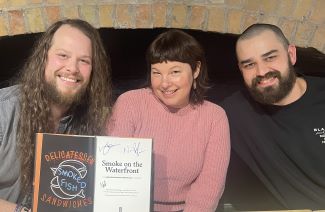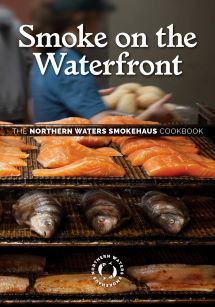Ned Netzel, Nic Peloquin, Mary K. Tennis, Greg Conley & Eric Goerdt, authors of Smoke on the Waterfront: The Northern Waters Smokehaus Cookbook
General Nonfiction Category, sponsored by Loren & Christine Danielson
Each week leading up to the 36th annual Minnesota Book Awards, we are featuring exclusive interviews with our finalists. You can also watch the authors in conversation with their fellow category finalists here.


What is one detail you wanted to include in this book, but couldn’t find a place for?
Mary: We wanted to include our recipes for salumi, which involves a dry-curing technique for sausage. We realized this would add an entire section to the book in terms of technique and equipment, so had to skip it for this book. Maybe a future project?
Ned: We had to cut so many recipes from the book, whether due to relevance/resonance to the project—which spent multiple years in development as a more hyper-focused book with the working title Preservation before growing into the collection it is today—or to concerns of space. A good example of the former would be Northern Waters Restaurant’s beloved Pork Belly Polenta, which rivals the culinary delight of any recipes present in the book, but ultimately didn’t fit with our early vision of the text and was left undeveloped. Salumi, summer sausage, and various dry-cured muscles meats (speck, lonzino, and the like) fall into the latter category: “Risky” procedures with extensive technique, rigorous safety requirements, and scientific underpinnings which would reasonably merit another book’s worth of attention and testing, while raising the barrier of entry to the book for the layperson.
Tell us about someone who proved instrumental to the creation of this book.
Mary: All the smokers working at the Smokehaus. They work with fish and meats everyday, and are experts on technique and ingredients. They were a constant source of information and fact-checking throughout the process.
Ned: Our production crew was invaluable to the process of reducing the recipes from mass production to home kitchen volumes, filling in the blanks between loose lists of ingredients in 3-ring binders, and breaking down the discrete processes and best practices into repeatable instructions. They’re a shy bunch, most of whom would balk at their names and faces in print, but they’re the hidden heroes smoking our fish and meats, stuffing sausages and salumi, and preparing kimchi and sauerkraut to our exacting standards on a consistent basis.
Tell us about a favorite read from the past year. Why did you find it enjoyable, insightful, or memorable?
Mary: In preparing an MBA thesis, I delved into some postmodern essays (like you do). I have read Roland Barthes’ Death of the Author before, but examining it in the context of its original publication was marvelous. It was part of the postmodern journal Aspen, and was a billet in a simple white box that also contained phonographs by Burroughs and Beckett among many other artists and musicians. It also included several models and shapes. Could we bring back the age of elevated journal ephemera, please?
Ned: The One-Straw Revolution by Masanobu Fukuoka is a fascinating book which calls into question the assumptions of modern agriculture and the limits of human intelligence, weighing them against his observations of the patterns and tendencies of the natural world. The heart of the book is an examination of the tenets of natural farming, often called “do-nothing” farming, which rejects modern agricultural technology and techniques in favor of an approach which emulates the natural world. It came recommended by farmer and permaculturist friends, and I do it a disservice trying to summarize it in a few sentences. It is in turns philosophical, political, and practical, and will leave you questioning commonly assumed human wisdom and practices.
Please tell us something about yourself that is not widely known.
Mary: I’m a horror buff. I love to watch horror movies of most every stripe, and could arguably say that the genre is what pulled me into the world of authorship in the first place. Lately, I’ve been trying to tease out my very own Northern Gothic novella. It’s harder than it seems to write scary.
Ned: NWS standpoint: We recently learned that our motto “Nos Fumant Aliquid,” translated (by us) as “We’re Always Smoking Something,” is, simply put, just bad Latin. A learnèd customer offered a few alternate grammatically sound Latin phrases which might better capture the sentiment, but none of them had quite the same ring as our faux-Latin phrase. Someday we may change it, but that’s so many T-shirts and customer receipts invalidated in the face of something as mutable as language.
Ned: As a child, I collected pennies. Over the course of a few years, I gathered 6,750 pennies. A sweet $67.50 that I combined with caddying and lawn-mowing earnings to purchase 5-string Fender Jazz bass that I still own and frequently play.

Share your thoughts about the role and value of libraries.
Mary: Libraries are so many things: gathering spaces, research spaces, discovery spaces, and calming spaces. They offer focus and solitude but also a connection to folks. They are that “third space” that humans deserve and crave, where their presence doesn’t involve a transaction but does include communion with knowledge and the word.
Ned: Librarians are keepers of the flame of human knowledge. The flame has gone out before, and it often seems on the precipice of being extinguished again; librarians document, organize, and preserve it. I really gave up on the flame metaphor there. Libraries are essential and necessary public services. They’re universal access to technology, knowledge, social resources, respite, and so much more. Imagine a world in which the sum of money that feeds the war machine were instead invested in libraries, and the communities which would emerge.
Northern Waters Smokehaus, in Duluth, Minnesota, has been crafting fine deli goods since 1998. These recipes were curated by Mary Tennis, Ned Netzel, and Nic Peloquin, with contributions from Greg Conley and Eric Goerdt.

